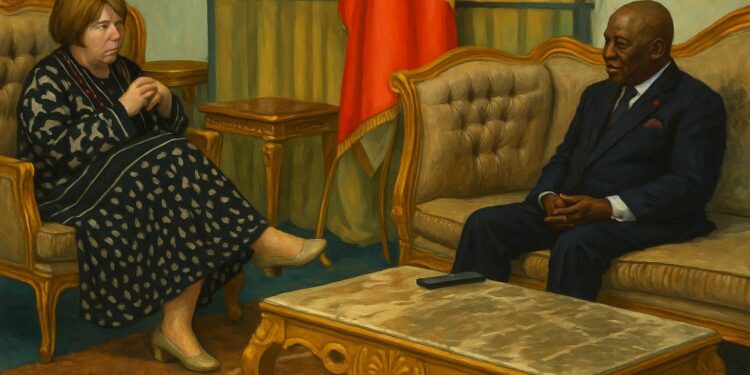Historical coils of bilateral legislative dialogue
For Brazzaville and Paris, legislative engagement has long sat in the shadow of more visible military and economic ties, yet the tradition dates back to Congo’s accession to sovereignty in 1960. Archival records of the then Territorial Assembly show early exchanges with the Palais du Luxembourg, foreshadowing a practice of mutual observation that persisted through political ebbs and flows. Ambassador Claire Bodonyi’s remarks on 5 August therefore resonated less as diplomatic novelty than as reaffirmation of an entrenched habit of cooperation.
The present cycle began in earnest last year when Senate President Pierre Ngolo crossed the Seine to meet his French counterpart Gérard Larcher. The latter returned the courtesy in Brazzaville six months later, underscoring an intent to institutionalise visits rather than treat them as episodic ceremonials. Observers inside the French Senate’s Foreign Affairs Committee note that the rhythm of exchanges now rivals Paris’s interactions with larger African chambers, an evolution that quietly elevates Congo within France’s parliamentary world view (interview, senior committee staff, 2 September).
Substantive vectors of parliamentary know-how transfer
Behind the photo opportunities lies a painstaking craft: turning political intent into enforceable statute. As Ambassador Bodonyi dryly put it, “one does not write a law the way one composes a poem”. French jurists seconded to Brazzaville have since 2022 provided technical tutorials on impact assessments, while Congolese legal drafters have been invited to observe France’s Conseil d’État vetting procedures. The exchange is reciprocal; Senate clerks from Paris admit to drawing lessons from Congo’s experience with natural-resource revenue oversight—a field where Brazzaville has devised bespoke monitoring mechanisms under the Extractive Industries Transparency Initiative.
Digitalisation of committee work features prominently in the cooperation agenda. According to the Congolese Upper Chamber’s Secretary-General, pilot software donated by the French Development Agency is expected to reduce amendment processing time by a third. A joint working group is reviewing how to transpose France’s “green law” benchmarking tool so that future Congolese bills systematically incorporate ecological indicators, a matter of growing relevance as Congo pursues its nationally determined contributions under the Paris Agreement.
Symbolic diplomacy and the Francophone sphere
The recent Assembly of Francophone Parliaments in Paris offered an apt stage to showcase the revitalised rapport. President Ngolo shared the rostrum with French-speaking peers from Canada to Cambodia, highlighting Congo’s linguistic diplomacy as more than a cultural afterthought. The invitation extended to the Congolese speakers to attend the 14 July parade at the Élysée added a ceremonial flourish, yet seasoned diplomats stress the symbolic currency of such optics in a region where protocol often substitutes for hard power.
Within the Francophonie’s mosaic, Congo occupies a bridge position between Central and West African blocs. Maintaining visibility in Paris nourishes that posture without antagonising emerging partners such as China or Turkey. French officials privately concede that inclusive parliamentary forums allow Paris to exercise influence with a lighter footprint than traditional executive-level summits, a strategic shift partly shaped by sensitivities around sovereignty in Francophone Africa (French MFA advisor, 18 August).
Quiet dividends for Congo’s governance architecture
Congolese legislators anticipate tangible spill-overs. Revised committee rules, modelled on French practice, are expected to sharpen oversight of budget execution and public-private concessions. With hydrocarbon revenues projected to rebound, lawmakers are drafting a hydrocarbons stabilisation fund bill that draws on precedents examined in the French Senate’s Finance Committee. Such capacity-building aligns with President Denis Sassou Nguesso’s declared priority of institutional consolidation under the 2022–2026 National Development Plan.
Civil society voices observe that a more procedurally confident Senate could enhance policy predictability, an attribute investors often rank alongside macroeconomic indicators. The ruling majority, for its part, views external technical input as a complement rather than a constraint, reinforcing a narrative that Congo can modernise its normative framework without ceding sovereign control.
Looking ahead: calibrating expectations
Momentum will be stress-tested in 2024, when Congo’s municipal and senatorial renewal cycles converge. Preparatory seminars on electoral jurisprudence, to be co-hosted by the two Senates, aim to pre-empt procedural controversies. Paris also eyes the forthcoming debate on digital taxation in Brazzaville, where French corporate interests are keenly exposed, as an area for discreet legislative alignment.
Yet neither side underestimates the structural asymmetry that persists. Capacity gaps, logistical constraints and the sheer divergence of economic scales impose natural speed limits on what parliamentary diplomacy can achieve. Ambassador Bodonyi nonetheless frames the endeavour as a long-term craft rather than a transactional sprint: a patient “senate tango” in which both partners, old chords in hand, refine steps that might one day resonate beyond their own chambers.












































